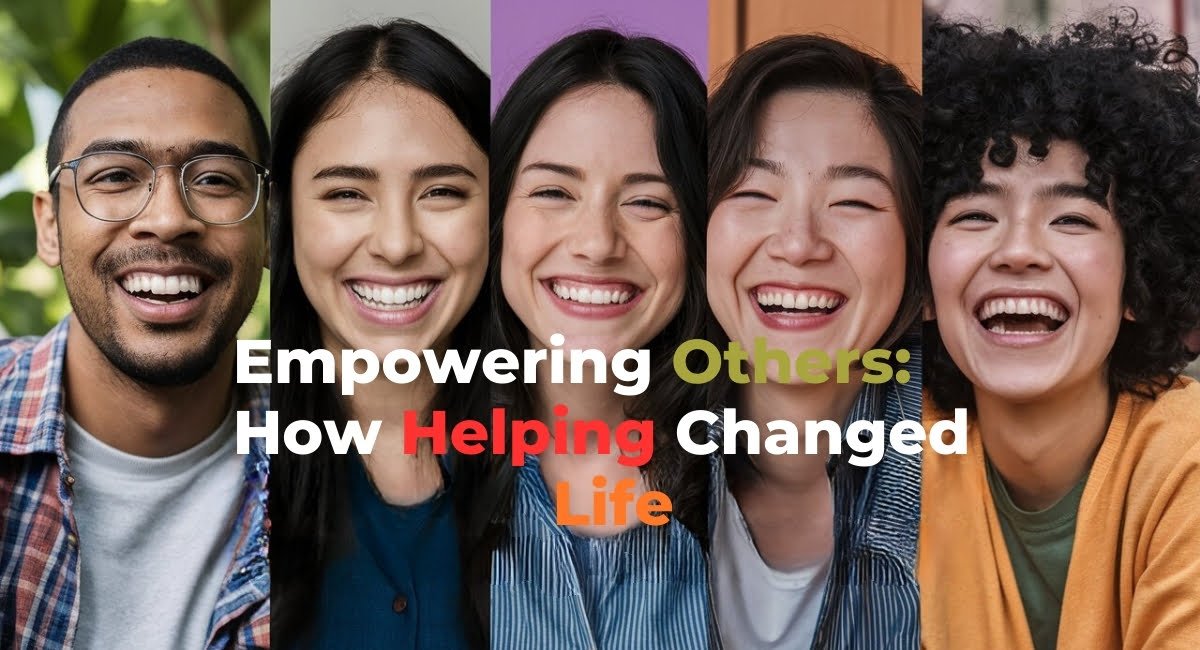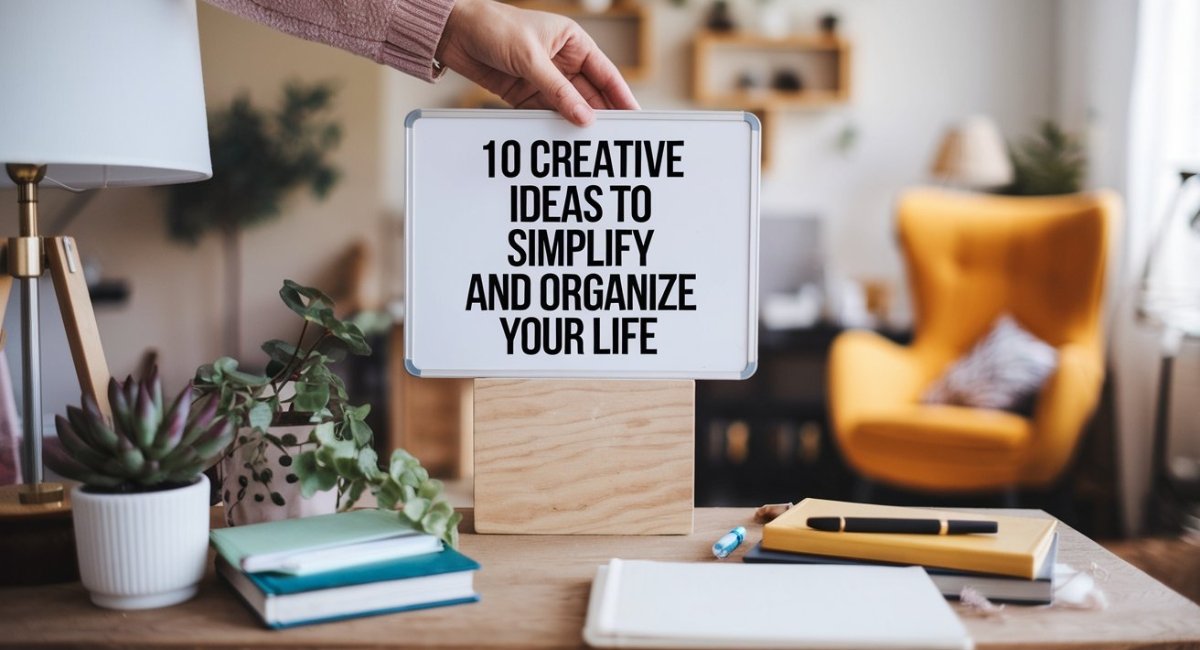Empowering Others: How Helping Changed Life
This post contains paid and/or affiliate links. I make a small commission at no extra cost to you. Please see our Privacy Policy.
Empowering others can change their lives in unique ways. People often say things like, “You changed my life. Thanks.” “You are like an angel to me.”, “Thank you isn’t enough to express how grateful I am for you changing my life.”
These words show how powerful it is to empower others. It changes not just their lives but also ours.
Helping isn’t just about giving money. It’s about giving genuine praise, honest advice, and support. It’s about helping people see their mistakes as steps towards success.
By believing in others, we help them see their potential. This leads to a brighter future for everyone.
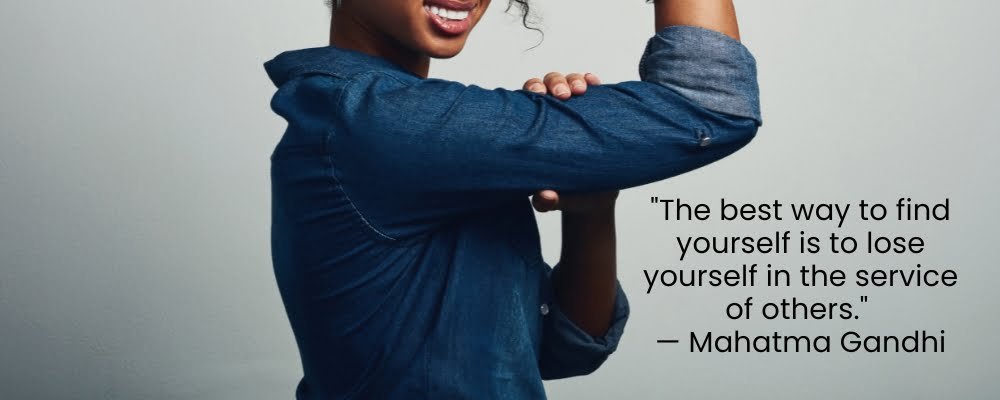
Key Takeaways
- Empowering others can transform lives in remarkable ways.
- Providing support, encouragement, and a positive mindset is essential for empowerment.
- Empowerment goes beyond financial assistance; it fosters personal growth and self-belief.
- Embracing mistakes and learning from them is crucial to the empowerment process.
- Empowering others not only changes their lives but can also enrich our own experiences.
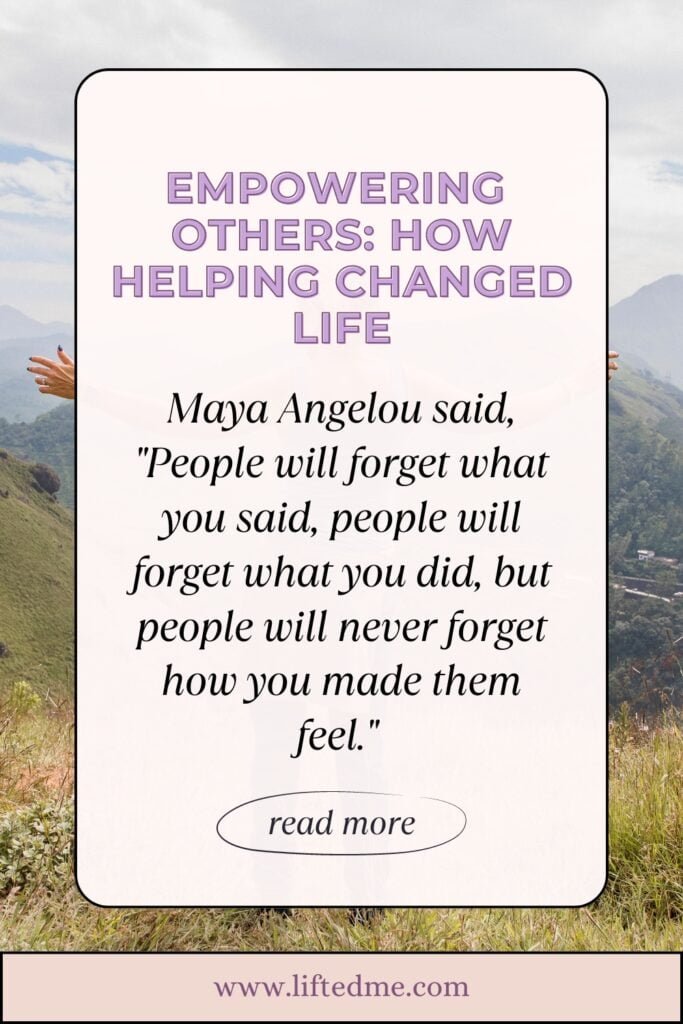
The Power of Empowering Others
Empowering others brings out a powerful force that changes lives and communities. It inspires, motivates, and boosts confidence.
By helping people find their strengths, we light a spark that leads to growth in their personal and professional lives.
The Ripple Effect of Kindness
Empowering actions spread far, touching more lives than just those directly helped. As we empower others, they are inspired to do the same, creating a wave of positivity.
This wave can change communities, building a culture of understanding, compassion, and unity.
Inspiring Leadership and Mentorship
Empowering others makes us their source of inspiration and guidance. Our actions and words shape our path. By inspiring leadership and meaningful mentorship, we help people reach their full potential and achieve their dreams.
“One of the greatest things you can do to help others is not just to share and give what you have, but to help them discover what they have within themselves to help themselves.” – Rita Zahara
Empowering others is more than sharing resources or knowledge. It’s about sparking something inside them, making them self-sufficient and resilient.
By doing this, we leave a lasting impact, inspiring many to make a difference in their ways.
| Statistic | Insight |
|---|---|
| An empirical observation shows that a small effort in empowering others can lead to significant positive outcomes. | The power of empowering others lies in its ability to create a ripple effect of positive change, even through small acts. |
| A substantial impact can be made in other people’s lives with non-financial contributions such as sincere compliments, advice on perseverance, sincere feedback, continuous motivation, and encouragement to accept mistakes as part of personal growth. | Empowerment is not solely about material resources; it can be achieved through emotional support, encouragement, and a willingness to share knowledge and experiences. |
| Empowering others can lead to personal growth as one learns from individuals’ unique experiences, ideas, and knowledge. It is a mutually beneficial process, allowing both the empowered and the empowered | to grow and expand their perspectives. |
| Teaching others can also expand their knowledge and provide time-saving benefits through information exchange. | Empowering others through teaching and knowledge-sharing can be a rewarding experience, leading to personal growth and increased efficiency. |
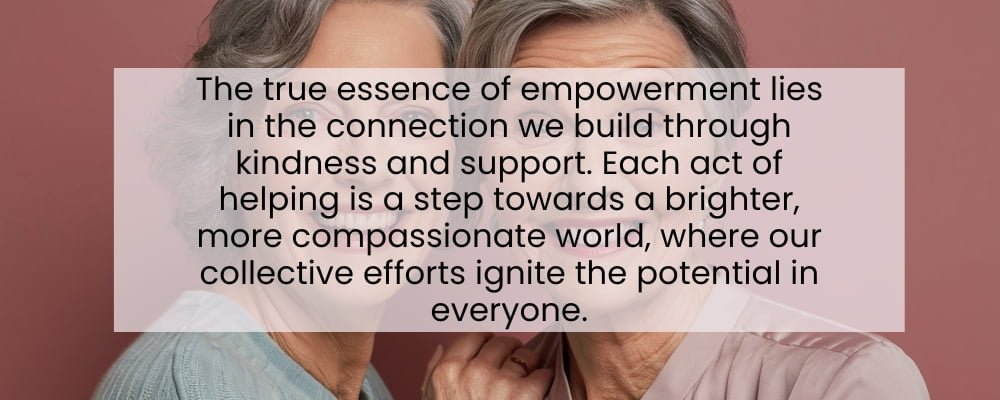
The power of empowering others is evident. By embracing this, we can make a world where people reach their full potential, communities flourish, and unity and compassion spread.
Empowering Others: How Helping Changed Life
Personal Growth through Acts of Kindness
When you help others without wanting anything back, you can feel refreshed. You learn new things from the people you help, which can change how you see life and people, leading to personal growth.
Maya Angelou said, “People will forget what you said, people will forget what you did, but people will never forget how you made them feel.” This shows how helping others change not just their lives but yours, too. By making people feel valued, you start a chain of kindness that touches many lives.
Helping others can be as simple as smiling or asking how someone is doing. These small acts remind people they are noticed and valued. Treating everyone with respect helps build a supportive community.
Helping others brings more than immediate rewards. It inspires others to help, creating a wave of positive change. It’s not just about giving; it’s about growing personally. It teaches us to be more compassionate and humble.
“Empowering others is one of the most important acts of kindness we can perform. It’s about not criticizing, not judging, not being cynical, and curbing our ego. It’s about praising others for their progress, no matter how small. Empowering others makes the world a better place.”
The journey of empowering others and seeing personal growth from acts of kindness is rewarding. It connects us, builds compassion, and positively affects people’s lives.
The Rewards of Volunteerism
Volunteering can make you feel happy and fulfilled. It gives you a sense of purpose. Seeing your efforts help others brings pride and a feeling of accomplishment.
Volunteers help meet community needs by offering essential services. They build social connections and strengthen community ties. This leads to more people getting involved and feeling responsible for their community.
Studies show that volunteering can change your brain and make you happier. It helps you manage stress better, prevents diseases, and makes you more satisfied with life. Regular volunteers feel more confident and have better overall well-being.
Volunteering also boosts community health by offering medical support and health education. It teaches people the value of service and citizenship.
Seeing others volunteer can motivate you to do the same, spreading kindness in the community.
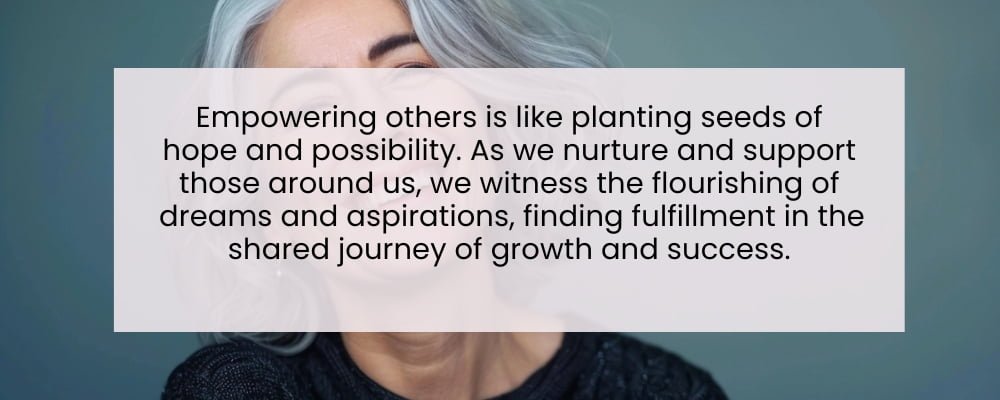
| Benefits of Volunteering | Impact on Individuals | Impact on Communities |
|---|---|---|
| Improved mental and physical health | Increased self-esteem and confidence | Strengthened community bonds and civic engagement. |
| Reduced stress and better-coping mechanisms | Sense of purpose and fulfillment | Provision of essential services and resources |
| Opportunity to gain new skills and experiences | Enhanced social connections and networking | Promotion of a culture of service and responsibility |
| Positive impact on career development | Improved overall well-being and happiness | Inspiration for others to get involved and give back. |
Volunteerism brings amazing rewards for both individuals and communities. By helping others, volunteers enrich their lives and make a positive change. This creates a wave of kindness and compassion that touches many lives.
Cultivating Emotional Intelligence
Empowering others needs emotional intelligence. This means understanding and managing your feelings and those of others.
By being empathetic and listening well, you can build strong connections. This support makes others feel important and empowered.
Understanding and Empathy in Action
Emotional intelligence, or EQ, is key to our personal and professional lives. The World Economic Forum’s “Future of Jobs Survey 2020” says it will be a top skill by 2025 and is becoming more critical.
Emotional intelligence has two parts: Interpersonal and Intrapersonal. Interpersonal intelligence is about understanding others’ feelings, while intrapersonal intelligence is about knowing your feelings and managing them.
Studies show emotional intelligence is more valuable than IQ in business. Companies now value it in hiring and training leaders. People with high emotional intelligence are more resilient, empathetic, and adaptable. These traits are key to success at work and in life.
Building emotional intelligence takes effort and growth. It means reflecting on yourself, learning, and changing.
By working on this, you can better understand and manage your feelings and those of others. This leads to better communication, solving conflicts, and stronger relationships.
“Emotional intelligence helps leaders motivate others, avoid groupthink, recognize opportunities, resolve conflicts fairly, and boost morale in the workplace.”
Understanding and empathy can help you tap into emotional intelligence’s power. This skill can help you and those around you succeed in new ways.
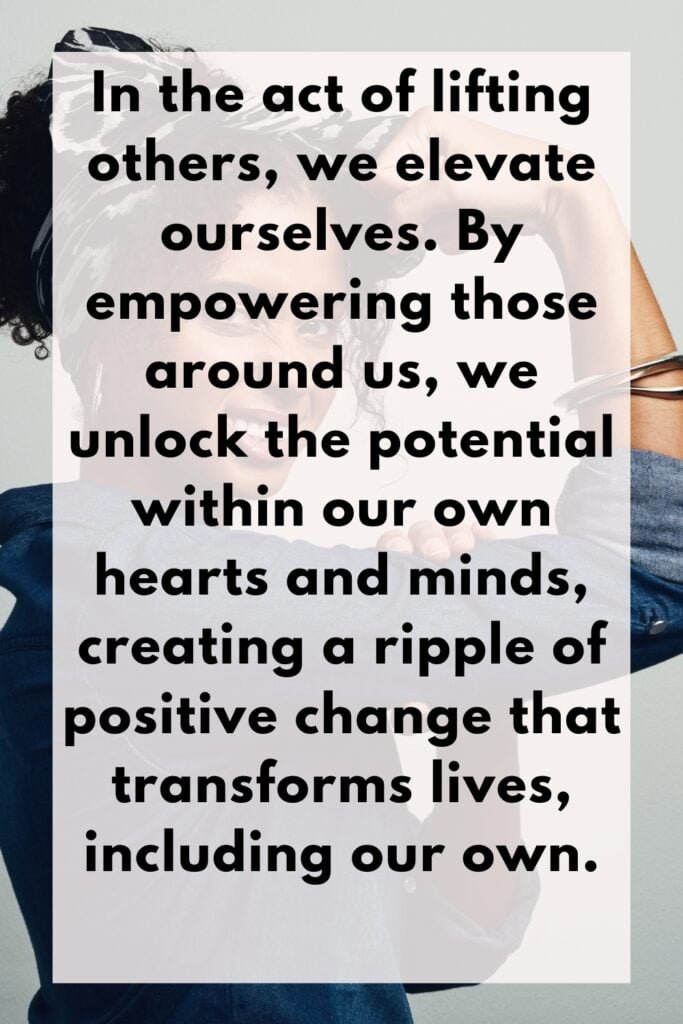
Transformative Experiences of Helping
Helping others can lead to significant changes in how we see the world. Acts of kindness can change our views and make us understand people better.
Seeing how our actions help others can move and inspire us to keep making a difference.
A natural feeling called the “helper’s high” comes from helping. It’s a mix of happiness and feeling fulfilled. This feeling is linked to better health, less stress, and a healthier heart.
Knowing the difference between charity and philanthropy is key. Charity helps right away, while philanthropy works on solving problems for good. This way, we can make a lasting change with our help.
Feeling connected to the cause we support makes our giving more meaningful. People who care deeply about the issues they help with give more and do better.
“Empowerment involves recognizing individuals’ unique talents, strengths, and potential, building trust, autonomy, and intrinsic motivation, rather than just implementing mechanical practices.”
Seeing people’s strengths and giving them the freedom to help can make a big difference. This idea is from EY’s Transformation Leadership research, which shows how to make significant organizational changes.
By choosing to help and empower others, we grow personally and make our communities better for a long time.
Building Community Impact
Empowering others does more than help individuals. It makes communities stronger and more united. By spreading compassion and unity, your actions can bring people together. This helps break down barriers and creates a sense of purpose and belonging.
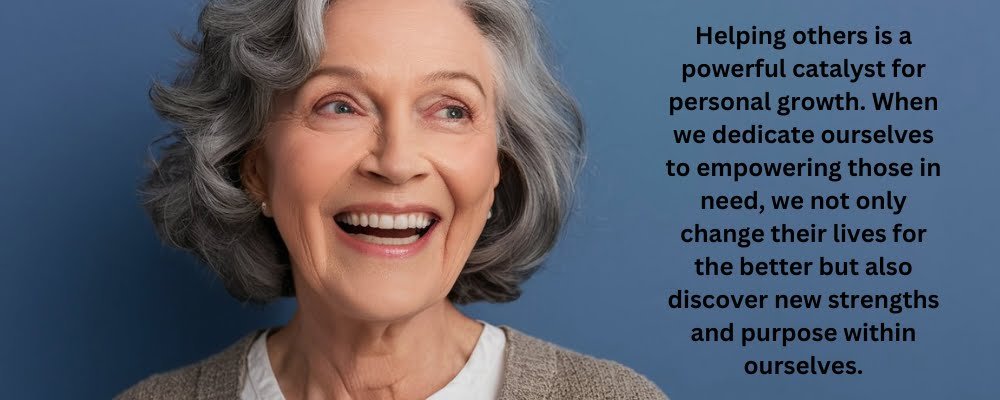
Fostering Compassion and Unity
Volunteering is a great way to build compassion and unity in a community. It starts a chain reaction, encouraging others to help out too. Whether helping at a shelter, mentoring kids, or cleaning up, small acts of kindness can strengthen communities and change lives.
Being active in local decisions is another way to empower communities. By taking part in decision-making, people can shape their neighborhoods. This makes them feel more connected and invested in their community’s future, leading to stronger, more united communities.
Supporting local projects is also key to building community. This can be through donations or by getting involved yourself. It helps the economy grow and keeps local culture alive, making everyone feel part of something bigger.
Mentorship and sharing skills are great for empowering communities, too. By sharing what they know, experienced people help others succeed, creating a culture of learning and growth for everyone.
“When you help others, you not only change their lives, but you also change your own. Empowering others is a gift that keeps on giving, bringing people together, and strengthening the fabric of our communities.”
We can make communities vibrant, welcoming, and strong by spreading compassion and unity. These are places where everyone can do well and contribute in meaningful ways.
Everyday Acts of Empowerment
Empowering others doesn’t need big actions—sometimes, small, everyday actions can make a huge difference. A simple smile, a kind word, or a thoughtful act can brighten someone’s day and show them their inner strength and potential.
Small Gestures, Big Impact
The power of empowerment often comes from everyday acts. Being there, listening, and supporting others can inspire them. It helps them believe in themselves and move towards their goals.
- A simple compliment can boost someone’s confidence and remind them of their unique strengths.
- Offering to help a colleague can ease their workload and show you’re there to support their success.
- Volunteering to mentor young people can give them the guidance and encouragement they need to reach their potential.
These small actions, done with real care, can deeply affect others. They show us that small gestures can make a big difference in people’s lives.
| Everyday Act of Empowerment | Potential Impact |
|---|---|
| Giving a sincere compliment | Boosts confidence and self-esteem |
| Offering to assist a colleague | Alleviates workload and shows support |
| Volunteering as a mentor | Provides guidance and encouragement |
By doing these everyday acts of empowerment, we spread positivity. We inspire others to reach their full potential. It’s the small things that can make a big difference in people’s lives.
Overcoming Challenges Through Empowerment
Empowering others can be a powerful way to help them face their challenges. By offering support and encouragement, you can help them find their inner strength, which can make them more resilient during tough times.
Empowerment can boost a positive mindset. Positive thinking can reduce stress, boost immunity, and increase creativity, giving people the courage to take risks. We’re more likely to tackle challenges head-on when we believe in ourselves.
Having a strong support network is key to empowerment. People who offer emotional and practical help can make a big difference. They can help others feel better about themselves and deal with stress.
Sharing personal stories can also empower others. Hearing about others overcoming tough times can inspire us to do the same. It shows us that we, too, can improve our lives.
Empowering others can inspire them to find their own strength, creating a community where everyone is more resilient. When we support and empower each other, we can all better face life’s challenges.
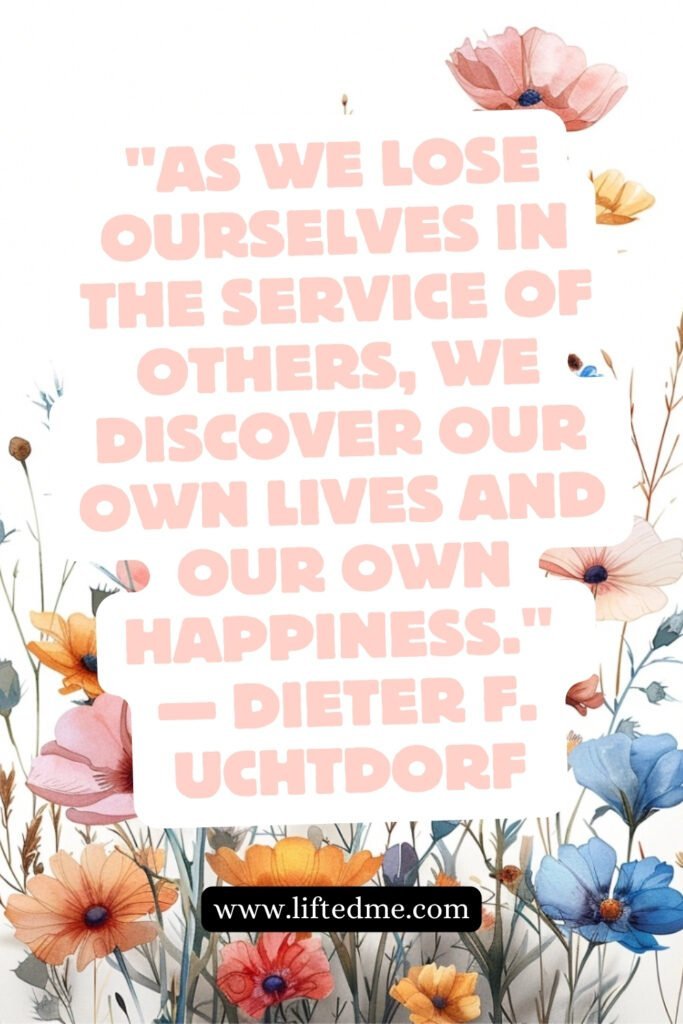
| Barrier | Impact | Strategies to Overcome |
|---|---|---|
| Lack of Vision | Wasted time, money, and energy | Develop a clear, guiding vision to stay focused and motivated. |
| Fear | Immediate disempowerment | Cultivate courage and self-belief to take calculated risks. |
| Impatience | Delayed success and progress | Practice patience and allow ideas to grow and evolve. |
| Perfectionism | Missed opportunities and delays | Find a balance between perfectionism and moving forward. |
| Workload | Disempowerment at Home and Work | Prioritize and ensure every action has a purpose. |
“Empowerment leads individuals and communities to become stronger and more capable, impacting those around them positively.”
By tackling these common barriers, people can reach their full potential, which empowers them and helps those around them.
Conclusion
Empowering others is a journey that changes lives and communities. By listening, encouraging, and creating welcoming spaces, we help people grow.
This leads to leadership and a strong feeling of community.
Empowerment creates a positive effect that spreads far. Every kind of act or support given can start a chain reaction.
We build a culture of thanks and motivation by celebrating others’ wins. This encourages people to act, speak out, and reach their dreams.
The true strength of empowerment is in its ability to break down walls and unite people. It leads to personal growth, stronger communities, and a kinder world. We empower others through volunteering, advocacy, or being there for someone.
This can change lives, build communities, and improve the world. Let’s keep working to make a difference, one empowered person at a time.
FAQ
How can empowering others change your life?
Empowering others changes both their lives and yours. You inspire them by giving sincere compliments, honest feedback, and motivation. This makes them believe in themselves and chase their dreams.
This creates a wave of positivity that can change communities for the better.
What are the benefits of empowering others?
Empowering others leads to personal growth and a deeper sense of purpose. It makes you happier and builds stronger communities. It also teaches you about kindness and broadens your view of the world.
How can emotional intelligence contribute to empowering others?
Emotional intelligence is crucial for empowering people. It means understanding and managing your and others’ feelings. By being empathetic and listening well, you build strong connections.
You show support and encouragement, making others feel valued and empowered.
What kind of transformative experiences can come from helping others?
Seeing how your actions affect someone’s life can deeply move and inspire you to make positive changes. Helping others leads to experiences that change your view and deepen your understanding of people.
How can everyday acts of kindness empower others?
Empowering others doesn’t need significant actions. Small things like a smile, a kind word, or a thoughtful act can greatly impact someone’s life. These actions remind them of their strength and potential.
How can empowering others help individuals overcome challenges?
Support, encouragement, and believing in someone’s abilities can unlock their inner resilience. Empowering others gives them the strength to get through tough times. It’s a powerful way to help them beat their challenges and adversity.
Source Links
- https://www.linkedin.com/pulse/empowering-others-natalie-fisher – Empowering Others
- https://www.theintentionaloptimist.com/blog/what-is-empowerment – What IS Empowerment, Anyway?
- https://annemckeown.com/empowering-vs-enabling/ – Empowering Vs Enabling – Anne McKeown
